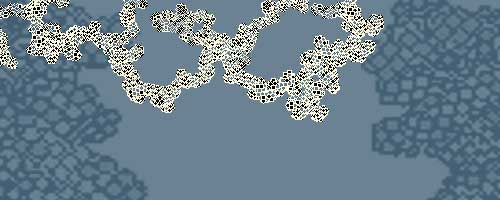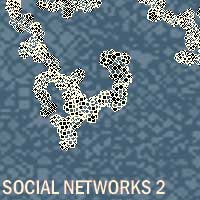|
|
 |
Databodies, Genitals, and Living Forever
|
|
Mark Gonzales on
May 15 2001 |
issue 16 |
This interview focuses on responses to the work of Victoria Vesna. Bodies Incorporated, Datamining Bodies, and Notime are the collaborative pieces examined and responded to. The interview addresses such topics as: 1) Developing an information personae through autonomous agents, social networks and databodies. 2) Living forever in a time with no end through technology. The interview also explores related issues such as transhumanism, expanded consciousness and transcending biological limitations. The interview concludes with a series of questions (to be answered in a time to come). The questions include: How can an uploaded person without a soul voluntarily cease to exist? Why must we go on without the body? And finally, how will a lost and soul-less higher machine find peace?
|
|
|
|
Intro: The following is a response to the creative work and writings of Victoria Vesna. I found her work extremely thoughtful and conceptually strong, but more importantly it made me want to think and create. Which is rare for me when interacting with most Art. Her collaborative pieces such as Bodies INCorporated, Notime, and Data Mining Bodies work on many levels and address complex issues. Concepts such as transcending our bodies, living forever, no time, and no death, are some of the ideas presented and explored. While researching Vesna's work and writings, many questions were raised and a need to dialogue and interact was established. The following is the result of this need and it serves as a take off point for further questions and creative exploration. The interview ends with additional questions to be answered in a time to come.
Biography: Victoria Vesna is an artist, professor and chair of the department of Design | Media Arts at the UCLA School of the Arts. Vesna's work has moved from performance and video installations to experimental research that connects networked environments to physical public spaces. She explores how physical and ephemeral spaces affect collective behavior. She completed her Ph.D. at the Centre for Advanced Inquiry in Interactive Arts (CAIIA) ,University of Wales under supervision of Roy Ascott. Her thesis was entitled: "Networked Public Spaces: An Investigation into Virtual Embodiment". Her recent collaborative works include; Bodies INCorporated, Datamining Bodies, and Notime.
Interview: The interview was conducted via email on May 20, 2001. Conducted by Mark Gonzales
MG: After reading the reviews of and responses to your pieces "Notime" and "Data Mining Bodies", I was struck by many author's fascination with the concepts of a "digital after life" and living forever in a time with no end.
How do these ideas concern you? And how do they affect your life and Art?
VV: I believe that there is no time. There is only constant change. The constructed time we live in is not working very well for us at this point, as is seen by the number of stressed out individuals that do not exclude you and me. We have moved away too far from any biological / analog measurements of change to nanoseconds, and are overwhelmed with information, processed much faster than we ever are built to absorb. As our bodies are reduced to large data-sets, we are entering into an entirely different age and need to start rebelling against the industrial / product(ive) time. Concepts of after-life and time with no end is a fascination as old as human kind. Whether digital technologies can help us solve some of those mysteries is an open question.
MG: Humans have been described as the genitals of a "higher machine" (Rickles, Mine too) and humanity has been described as being in a "transitory stage; that is, it is a primal step in the process of the evolution of a higher being?" (www.e-wired.com)
Do you think that humans are the "genitals" of a higher machine to come? And are we as humans in a transitory stage waiting for our "machine bodies" to take us to the future and eliminate our biological limitations?
VV: No, I don't think we are the genitals of the higher machine. And I believe that Rickles was being cynical when he used that metaphor. I would agree that we are in a transitory stage, but I would also add that we will always be in a transition from one state to another. There is no point of a complete static state in any evolution, a state that lasts forever. This type of thinking, is the epitome of the mind / body separation, and I am amazed that mature scholars would actually promote this viewpoint. Recently I attended a talk by Hans Moravec and I was struck by the simplicity of his thesis and wondered if he was doing this to get attention or if he really believed that we are biologically limited. The idea of creating, in his words, "happy slaves", was astoundingly lacking in critical thinking and certainly in compassion for those, in this country, who share a history of slavery. Then it occurred to me that I know of no women who subscribe to this type of view, which makes sense since we are able to create life! It is really a matter of consciousness raising. The limitations are in our minds.
MG: In your piece, "Date Mining Bodies", as data is ingested the body dematerializes down to a wire frame until it finally explodes, leaving the data to represent itself.
Where will all of the unpredictable, unprotected and vulnerable Autonomous agents find peace in a world with no end?
VV: This data is not separate from the people who carry it. What is exploded is the representation of the self in the digital realm as a physical corporeal body. We have to work towards developing a new language and moving away from the flatland that is representing this network of people's thoughts. Agents are going to play a major role in this, and it will be interesting to see what happens as they get out of control. This unpredictable realm of information assuming a life of its own is a most interesting territory to explore. Where will it end? If any of us even had a clue, it would be much less intriguing, wouldn't it?
MG: What projects are you currently working on? What issues are you currently addressing in your work?
VV: I am working on a large collaborative project dealing with the idea of community and time. How does one create a community of people with no time? My main collaborators are Gerald de Jong, who is the author of fluidiom software, composer David Beaudry and sculptor Tim Quinn. The piece was commissioned by Walker art Center and is traveling with the Telematic Connections: the Virtual Embrace exhibition curated by Steve Dietz. A full description and explanation of this project is on our site, which I hope you visit and explore. Since this project launched quite recently we are eager to get feedback from people who have the time to think about time....
MG: Thank you
VV: Let me know what you think and if there is anything you want me to further elaborate on.
Further questions (to be completed in time):
MG: When developing personalities from individuals and social networks (information personae), how could one develop personality traits such as creativity?
MG: Time to come? What is the time to come? What will it be like?
MG: How can an uploaded person without a soul voluntarily cease to exist?
MG: Why must we go on without the body?
MG: Is our current social structure trying to make us happy slaves?
MG: Can a slave be happy?
MG: What is the soul? What about the soul? Where will that go? How will a lost and soul-less higher machine find peace?
MG: Why do I even care about peace for a bunch a wandering vulnerable data?
Research References:
[1] Victoria Vesna/Biography http://vv.arts.ucla.edu/bio/bio_frameset.htm
[2] Victoria Vesna, DataMining Bodies http://notime.arts.ucla.edu/mining/
[3] Victoria Vesna, Notime http://notime.arts.ucla.edu/
[4] Victoria Vesna, Marketplace: From Agents and Avatars to the information Personae http://vv.arts.ucla.edu/publications/publictions/html/marketplace.htm
[5] Victoria Vesna, Robert Nideffer, Bodies INCorporated, Theoretical Appropriation for Somatic Intervention http://vv.arts.ucla.edu/projects/projects_frameset.htm (projects 1998-1999)
[6] Data Mining Body/Article http://www.vision-ruhr.de/artists/vesna/index.html?lang=en
[7] Victoria Vesna, Bodies INCorporated, Terminals: Fear of Deletion and the Eternal Trace http://vv.arts.ucla.edu
[8] Mine Too, Laurence A. Rickles http://notime.arts.ucla.edu/mining/essay.html
[9] Transhumanism Resource http://www.aleph.se/Trans/
|
| |
|
 |
|
 |
|

|
::CrossReference last 5 articles posted by Gonzales :: America ®: The Ultimate Killer App - Mar 9 2003 :: An Interview with Sharon Daniel - Feb 21 2002 :: Databodies, Genitals, and Living Forever - May 15 2001
|
|
|





